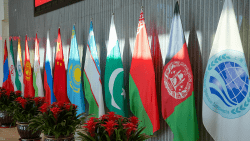Bishkek, October 26, 2023 (TDI)– In a significant development with far-reaching implications for global finance, Russian Prime Minister Mikhail Mishustin has proposed creating an autonomous payment mechanism for members of the Shanghai Cooperation Organization (SCO).
If this proposal is adopted, it could potentially divert a substantial 20% of the world’s GDP away from US dollar-dominated transactions.
The suggestion was brought to light following the recent deliberations during the SCO Council of Heads of State meetings held in Kyrgyzstan.
Prime Minister Mishustin emphasized the need for an “independent regional mechanism for payments and settlements within the SCO” to facilitate currency conversions on national exchanges.
This initiative stems from a logical progression in the financial landscape.
The introduction of BRICS Pay has already been set in motion, and the process of its rollout is underway.
The SCO member countries, by implementing their independent payment mechanism, would gain the ability to engage in trade without dependence on the US dollar, Euro, or the SWIFT financial network, which is predominantly controlled by the United States and has previously been employed to block countries such as Iran and Russia from its services.
The Shanghai Cooperation Organization currently comprises nine Member States, including China, India, Iran, Kazakhstan, Kyrgyzstan, Russia, Pakistan, Tajikistan, and Uzbekistan. In addition to these full members, three Observer States—Afghanistan, Belarus, and Mongolia—express their interest in full membership.
Read More Pakistan’s Foreign Minister to attend 22nd SCO Council of Heads meeting
Furthermore, the CIS, ASEAN, and Turkmenistan also enjoy the status of being Observer States. Additionally, the SCO boasts nine Dialogue Partners, namely Armenia, Azerbaijan, Cambodia, Egypt, Nepal, Qatar, Saudi Arabia, Sri Lanka, and Turkiye, all aspiring to become dialogue partners or full-fledged members in due course.
Mishustin underscored the necessity of eliminating legal and administrative barriers to promote mutually beneficial economic cooperation within the SCO.
He called for concerted efforts in developing modern payment infrastructure, stating, “We have been increasingly using our own currencies in settlements.”
The combined gross domestic product (GDP) of the nine full members of the SCO amounts to approximately US$21 trillion, representing roughly 20% of the total global GDP.
This underscores the immense potential impact that the adoption of an independent regional payment mechanism could have on the international financial landscape.
This groundbreaking proposal by the Russian Prime Minister opens up new avenues for diversification and decentralization of global transactions, reducing dependency on traditional financial networks and currencies.
It represents a significant step towards redefining economic interactions on a global scale, fostering self-reliance among SCO member countries, and challenging the dominance of the US dollar in international trade and finance.
As discussions and deliberations continue, the financial world will closely watch the unfolding developments within the Shanghai Cooperation Organization.
The Diplomatic Insight is a digital and print magazine focusing on diplomacy, defense, and development publishing since 2009.








